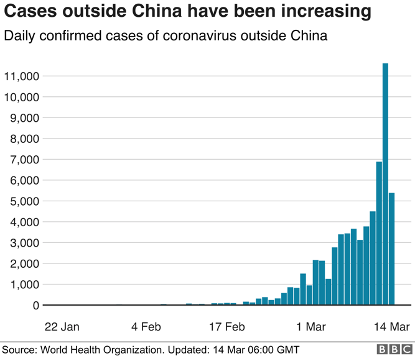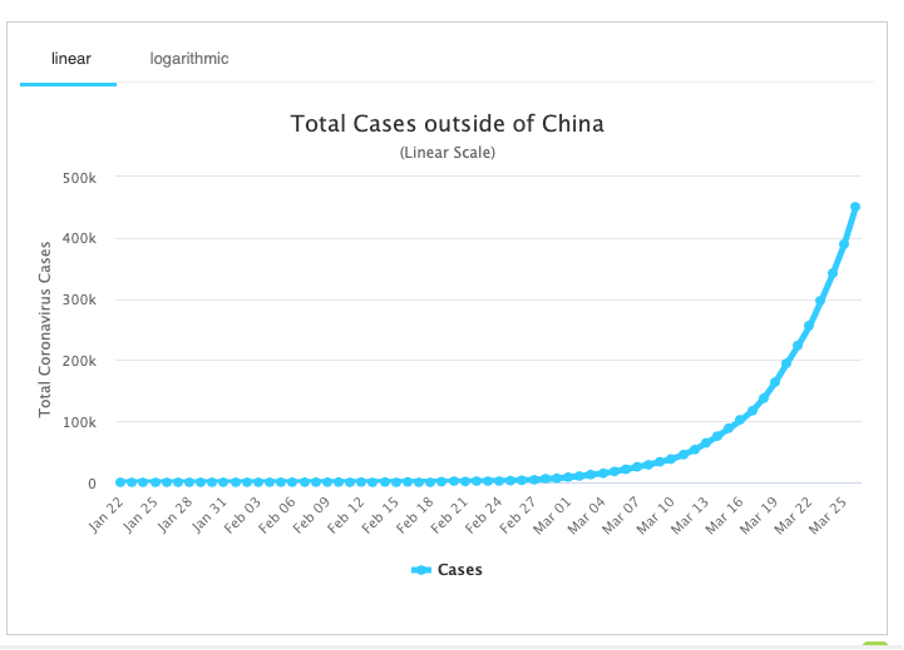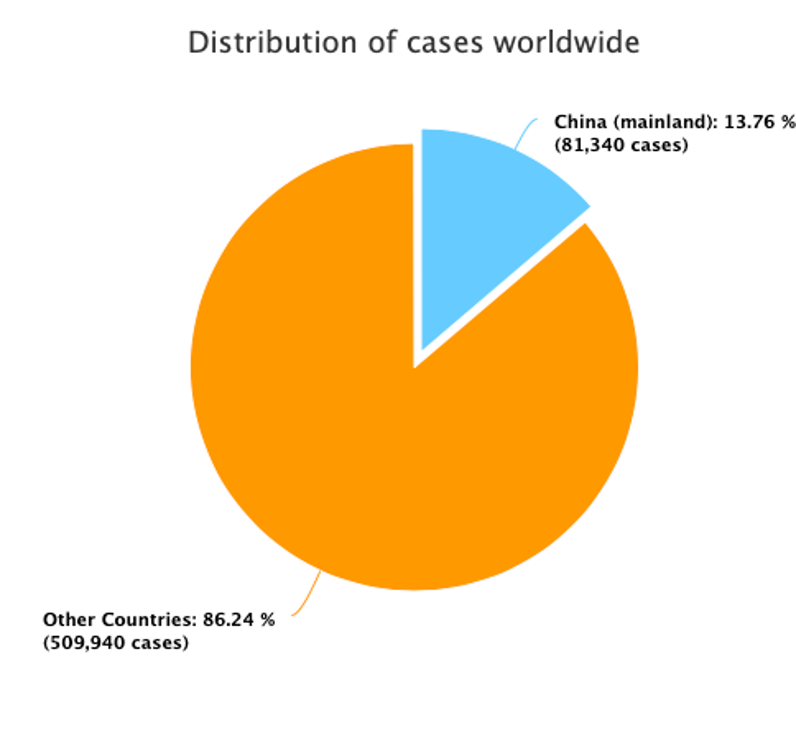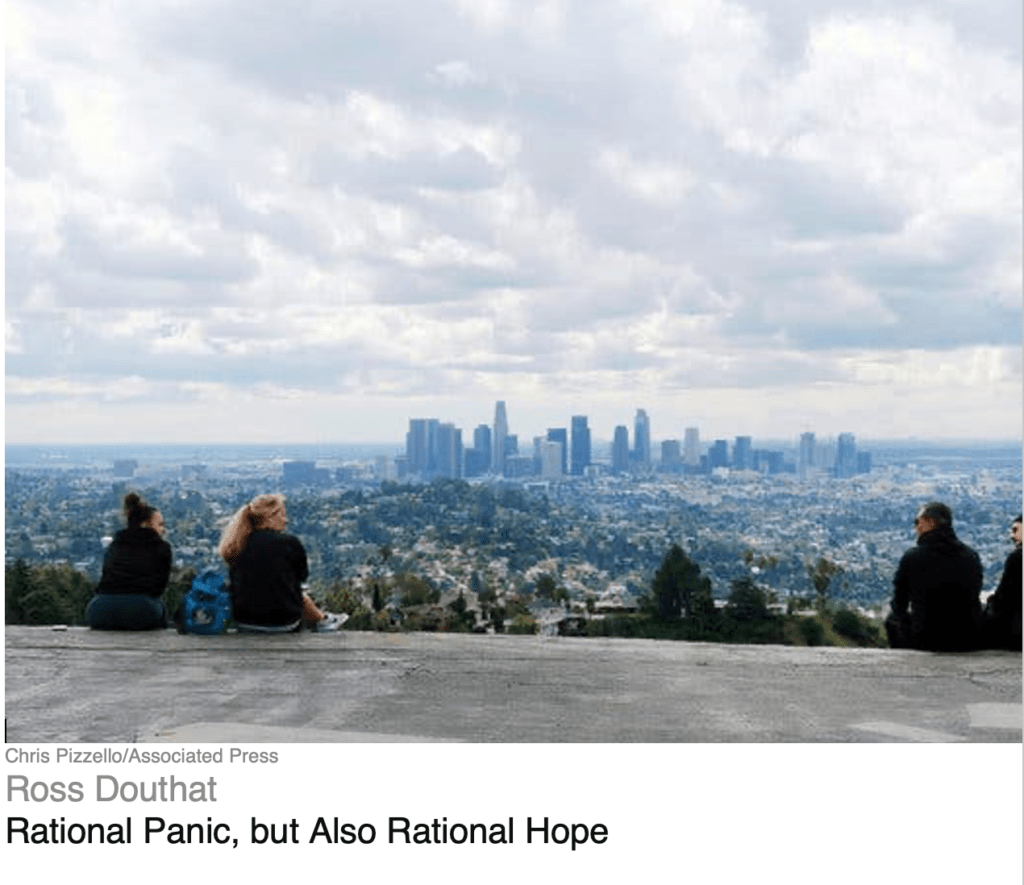A human nightmare destroying global, social and economic orders
A deadly outbreak from an unknown origin has been hitting within a short period of time the world’s community of nations with an amazing speed. This new and perniciously contagious virus was named COVID-19 by the World Health Organization (WHO). So far, the disease caused by the virus did not only have devastating effects on individual health and circumstances, but its deep and unforeseen impacts are felt along the entire socio-economic and political spectrum in every corner of the world.

Authorities worldwide are rushing to contain the spread of the COVID 19, as some countries outside China experience a massive spike in infections. The virus has reached more than 178 countries and territories, with over 840,000 infected and so far it has caused nearly 42,000 deaths worldwide. Its present epicenters are in Asia (outside of China) the Republic of Korea, in Europe Italy and Spain, and in the United States New York State, Washington State, California and Louisiana. Fears are rising in the Middle East too. Iran has confirmed 140,000 coronavirus cases, and several thousands deaths. India, Pakistan Lebanon, Israel, UAE, Kuwait and Afghanistan have also reported cases and are bracing for a further spread.
German Chancellor Merkel, in her first public TV address to the German people stated that “Given a virus for which there is no immunity and no immunization, we have to understand that many people will be infected”. This prediction rattled many in Europe and in other continents. “The consensus among experts is that 60 to 70 percent of the population will be infected.” (www.worldmeters.info)
Facing a total lack of preparedness, and increasing numbers of affected people, most countries followed the Chinese approach in Wuhan and Hubei Province where close to 60 million inhabitants had been locked down with only very limited outing opportunities. Soon thereafter, a cascade of regulations in other countries was imposed, ranging from total lockdowns of cities and regions to stay-home orders/lockdowns, social distancing and gathering of no more than 2 persons. Spain, Italy, and France took the lead. Partial closures were introduced also in Germany, New York City, San Francisco and other US cities as well as belatedly the United Kingdom and London. that gradually reinforced. Borders between countries were ordered closed and the free movement of people across Europe, the United States and neighboring Canada and Mexico was interrupted. Around the world, schools, universities and all other educational centers were shut down. Many schools resorted to distance and online learning. These measures marked a turning point in the life for many people, which may well be disrupted for the foreseeable future.
Businesses and investors are adjusting to this new reality, in which everyday social interactions are altered, travel restricted, borders closed and general economic activities seriously curtailed. Observing the advance of the virus beyond any control, the World Health Organization declared a few days ago the United States as the new epicenter of the pandemic. Although the term is largely symbolic, the decision to use it was a sign of growing concern among public health officials about the failure to contain the virus in the United States, which has seen more than 183,000 people infected (as of 30 March 2020) and 3680 killed, half of it in New York City alone. The latest scientific predictions envisage nearly 100,000 deaths in the USA alone. Dr. Tedros Adhanom Ghebreyesus, the Director-General of WHO, stated at a news conference in Geneva: “We cannot say this loudly enough or clearly enough or often enough.” “All countries can still change the course of this development.” With the virus now in more than 150 countries, the WHO cited “alarming levels of inaction” and urged affected countries to “test, test, test”. The WHO has hailed the draconian measures taken by China, which seem to have led to a dramatic decrease in new cases at the center of the outbreak.
The two charts below shows the increase of cases outside China within a period of two weeks.


Worldwide, given this unusual “new normal“ situation, many important international games and sport events have been postponed, including the Tokyo Olympic Games 2020, now postponed to July 2021. Unusually, the Olympic torch lighting in Greece for the Tokyo 2020 Olympics was held without spectators in attendance for the first time. Likewise world cup ski races in Sweden, figure skating world championships in Montreal, and other international sporting events in Argentina were canceled until further notice.
International politics are also affected. COP15 (Conference of Parties) of the Biodiversity Convention planned for end-October in Kunming, China was postponed. Other major international events like COP26 of the Climate Change Convention scheduled for November in Glasgow, UK, and IUCN scheduled for June in Marseille, France, may likewise be affected. Within the European Union, Prime Minister Andrej Babis of the Czech Republic has already proposed that the European Green Deal, a new policy package that commits European Union member states to zero emissions by 2050 which had just been unveiled at COP 25 in Madrid at the end of last year, should be set aside so that countries can focus on fighting the pandemic. In China, the annual meeting of the National People’s Congress was postponed to a later date and the US Democratic Party has changed the voting procedure for pending Primaries to designate a Presidential candidate to mail-in voting. In New York, the United Nations is also under confinement and the Security Council ponders to hold virtual meetings.
The virus sent stock markets into turmoil. The Dow Jones lost in one week close to 12,000 points (25 per cent of its value), the Hong Kong Hang Seng dipped over 3,500 points and all other leading markets lost enormous amounts. This prompted the US Government to adopt the largest support package ever in the history of the country amounting to an injection of 2.2 trillion US dollars aimed at saving major industries, the banking system small enterprises, hospitals and unemployed. Yet, uncertainty, if not fear prevails and persists as shown in the gyrations of the stock markets’ movements everywhere.
Fear of contagion has given rise to an adoption of some drastic measures by numerous Governments at state, provincial and city levels, leading to disruptions of routine practices and denting all social interactions and behaviors. Social Isolation of those afflicted by the virus and withdrawal of those who are worried to be affected by daily routines and social and cultural activities are not that easily digested. The demands on countries’ public health systems have never been experienced. With two-thirds of the world population living under quarantine and staying at home, the damage has already been severe and has reached a surprising array of sectors. Telework has become mandatory for innumerable employees and workers. The world’s economic and social activities have come to a complete halt. Global supply and production chains have been disrupted and interrupted manufacturing. Major airlines have grounded their entire fleets. Hotel and tourism industries have shut down as all reservations have been cancelled. The cruise industry has experienced a public-relations nightmare with more than 4,200 passengers quarantined aboard the Diamond Princess cruise ship in Yokohama and the Carnival Princess In the Caribbean. This manifested the inability and unpreparedness of many Governments and businesses to deal with the unknown virus challenge. Globalization as a whole may need to be revisited. The problematic aspect of the new virus is that it is not yet clear how it is transmitted, how easily, and how lethal it might be, how widely it has and will spread – and when there will be a reliable vaccine and treatment.
As societies adjust to these new realities and cascading governmental regulations, life in many places will no longer be the same for the foreseeable future. Everything is bound to be disrupted and transformed in an unexpected and unpredictable manner – politics, economy, production and consumption, work, transport, everyday social interactions, schooling and learning, health, relaxation, holidays.
Some good news comes from the philanthropic sector that is beginning to allocate substantial resources to coping with the crisis. The Bill & Melinda Gates Foundation has committed up to $100 million toward efforts to help strengthen detection, isolation and treatment efforts, to protect at-risk populations, and to develop vaccines, treatments and diagnostics. Hong Kong investor and philanthropist Li Ka Shing has donated $13 million to assist Wuhan, where the outbreak had been concentrated. Alibaba founder Jack Ma has committed $14.4 million, including $5.8 million to fund research into a vaccine.
The following charts illustrates, as of 28 March 2020, the total cases and daily increases outside of China.

Source: Worldometer – www.worldometers.info
Governments are increasingly enacting policies that would never have been imagined. Financial markets are crashing. The United States registered a staggering number of 3,38 million persons who applied for unemployment benefits – higher than at the Great Depression. Strict restrictions on public movement are being introduced. Confinement at home becomes the widespread practice to contain the virus. Public and private scientific expertise is being marshaled to solve the novel medical challenges arising from COVID-19.
Coronavirus and Climate Change
Beyond the health and economic developments, something strange is happening. In China and Italy, as well as in many other countries, the air has become strikingly clean and pollution levels have dropped dramatically in many countries. Venice’s Grand Canal, normally suffering from foul water is beginning to run clearer. In Seattle, New York, Los Angeles, Chicago and Atlanta, the fog of pollution has lifted. The same holds true for major Indian cities, which earlier had registered the world’s highest pollution levels.
Coronavirus has led to an astonishing shutdown of economic activity and a drastic reduction in the use of fossil fuels. In China, measures to contain the virus in February caused a drop in carbon emissions by an estimated 25 percent. The Center for Research on Energy and Clean Air estimates that this is equivalent to 200 million tons of carbon dioxide — more than half the annual emissions of Britain. In the short term, the drastic response to the pandemic seems to have had a positive effect on emission levels.
So in the longer term, will the virus help or harm the climate? As the United Nations Secretary-General recently noted, the threat from the coronavirus is temporary whereas the threat from heat waves, floods and extreme storms resulting in the loss of human life will remain with us for years.
Our response to this health crisis will surely also influence the climate crisis for decades to come. The efforts to revive economic activity – the stimulus plans, bailouts and back-to-work programmes being enacted now – will help determine the shape of our economies and our lives and lifestyles. The resulting effects on carbon emissions may in the long run reverberate across the planet. Changes in work habits, personal consumption patterns and travel habits may, in fact, herald the beginning of a meaningful global shift. Sweeping changes in individual habits – particularly in wealthy countries with high per capita consumption – could lead to lower carbon emissions and pollution, which would be an unequivocal good. Which is to say, in order to be meaningful for global emissions, changes in consumption habits as a result of the virus would need to extend beyond individuals to the larger structures that shape our lives.
In China, it wasn’t telecommuting or grounded planes that led to a 25 percent drop in emissions. It was the abrupt halt of industrial manufacturing. It was also a significant reduction in air travel with a concomitant decrease in air fuel emissions. If anything, the short-term positive effects on the climate that we are seeing today serve as a dramatic reminder that changing personal consumption habits and a de-carbonization of the global economy will have an important impact for limiting climate change.
Despite the clean air and the cleaner water in canals which we are observing over the past three weeks only, the coronavirus may also have disastrous consequences for the climate. The virus may lead to a global oil demand surge, given its biggest price contraction in history, discouraging investments in renewable energies. Dips in emissions had also occurred during the 2008 world financial crisis and the oil shocks of the 1970s, after which emission levels bounced back along with economic recoveries. If capital markets lock up, it may become difficult for companies to secure financing for needed solar, wind and electric grid projects. A global recession as a result of coronavirus shutdowns and cheaper energy could also slow or stall the shift to clean energy. A large share of the world’s solar panels, wind turbines and lithium-ion batteries are produced in China. The clean energy analyst Bloomberg NEF has already downgraded its 2020 expectations for the solar, battery and electric-vehicle markets, signaling a slowdown in the clean energy transition, while we urgently would need to speed it up. Coronavirus is bad for the climate even on most macro levels. Lockdowns and social distancing have slowed climate research around the world or have grounded to a halt. NASA is on mandatory telework. Research flights to the Arctic have been stopped, and fieldwork everywhere is being canceled. No one knows how much climate data will be collected as a result, or when research might be able to start up again.
Gatherings of world leaders to address the climate crisis are being delayed or canceled. As mentioned before, the COP26 of the Climate Change Convention, planned for November next in Glasgow, might be pushed back due to the virus pandemic. This might thus slow or derail already sluggish international climate action, as countries – under the provisions of the 2015 Paris Agreement – are supposed to announce new pledges to reduce emissions. Going forward, public attention is likely to be diverted from the climate by ballooning fears over health and finances, and climate activism that depends on large public protests is being forced indoors and online. Where and how will all this end? It definitely needs determined and clairvoyant political leadership, reliance and confidence in scientific evidence and advice, and effective international cooperation to overcome all set-backs and tackle the persistent and newly added challenges.


